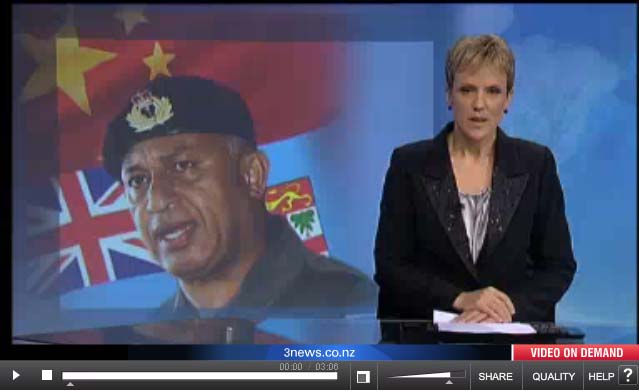
Michael Morrah
 At the Fiji Sun they print positive government stories. It’s not because they want to, but rather that they have little choice.
At the Fiji Sun they print positive government stories. It’s not because they want to, but rather that they have little choice.
“As journalists, it is our duty to be fair to all. But we cannot report all this because the censors are here ...because they have their own guidelines,” explains Weekend editor Meika Bolatiki.
Those guidelines from the Fiji government say media organisations must not include any material against the national interest, or that creates communal discord.
The weekend editor told 3 News he supports the decree.
“It is our belief at the Fiji Sun that we have to write positive stories to move the country forward,” continues Meika Bolatiki.
Every night, just before deadline, two government censors come to the newsroom to check the stories.
“We are just looking at all the stories that they will publish in tonight’s edition for tomorrow,” explains information officer Isaac Lal. “We know that some journalists have a background of always criticising and looking for unfair stories.”
They will remove words, paragraphs or whole stories if they think it is necessary.
On this occasion, there are no problems at the Fiji Sun, but it is a different scenario at the Fiji Times.
A headline on a story about graduates struggling to find jobs is deemed misleading.
The story is shortened and in the morning a different headline appears in the paper.
The penalties for breaching content regulations is a maximum fine of $100,000 for a media organisation, or in the case of a publisher or editor a fine or up to two years in jail.
Journalists must include a byline on stories over 50 words.
“They want to keep a track of what individual journalists are writing and what position they are taking and keeping an eye on that which is obviously unacceptable,” explains associate professor at Canterbury University Law School Ursula Cheer.
The government’s muzzling of the media isn't the only problem for the Fiji Times - it fears it is being forced out.
Under the rules of the decree, foreign media ownership is limited to 10 percent. The Fiji Times is wholly owned by Australia’s News Ltd. The paper has been given just three months to find a new buyer.
The Attorney-General believes the Times has a tendency to politicise issues.
“That stops us from modernising ourselves and carrying out reforms, then obviously there is merit in ensuring that that sort of fictitious, emotional reporting does not come to the fore,” says the Attorney General.
Back at the Fiji Sun, the editor tells me five journalists have left in the past year for personal reasons.
However, another source - whom 3 News will not name - said it is difficult to do justice to the word journalism when the government's telling you what to do - and they can do little about it, except leave. - TV3/Pacific Media Watch



